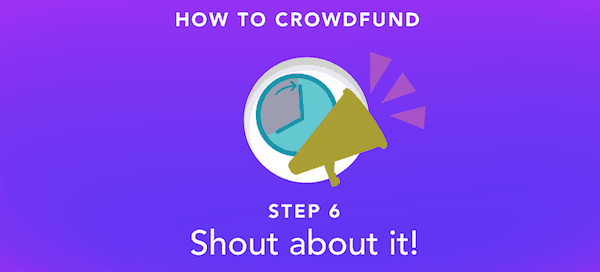This week, Crowdfunder UK offered up two types of advice for the How to Crowdfund series. Recently, the reward-based crowdfunding platform revealed how important communication really is for campaigns.
 The Crowdfunder UK team declared in a blog post:
The Crowdfunder UK team declared in a blog post:
“When you have done a good job on something, and you know that’s it’s worth a shot, then the most obvious thing to do is to shout about it! But don’t just go shouting at people. You want to engage these people! Talk TO them & not AT them.
“By now you should have already created your networks. If not, you’re running a little late & should action that now! Create Twitter, Facebook, Google+, Instagram,Pinterest & Tumblr accounts for your project, and connect with similar online groups to discuss your project. Make sure your team is in there doing the same thing. To have the greatest chance of success, this should have been started a month before your project is uploaded.
“Before you go live you should have started your conversations across social media about what your plans were, and that your project was coming. During your project you should have kept the conversation going across social channels. As your project progresses, you should be keeping people up to date about what is happening and the progress you have made, again across all social channels. Social media also helps facilitate a two-way conversation with updates, comments and feedback on the project between funders and entrepreneurs.”
Crowdfunder UK also revealed how campaign organizers should use their resources to get the project into the spotlight:
- Family and friends: Get them sharing for you. Not just your family & friends, but everyone associated with your project’s family & friends.
 Get Tweeting!: Tweet a few times a day, retweet other peoples messages and respond to tweets to keep the momentum going.
Get Tweeting!: Tweet a few times a day, retweet other peoples messages and respond to tweets to keep the momentum going.- Co-workers, teammates, business associates and casual acquaintances: Some organizations can provide wide networks of potential donors (if you provide them with a direct link to share, it makes it an easier task to ask of). A tweet or a blog post from them, can communicate your project to thousands of followers and readers.
- Local organisations related to your project: Ask if they’d be willing to publicize your project through their social media.
- Social media influencers: Target those that have clout in your target crowd.
- Tagging people: When making that social media post/update/status, tag people who you think would be interested in your project. (always make sure you have the URL to your project in the update)
Crowdfunder UK also recommended that campaign organizers try all types of communication:
- Press and general public: Approach your local newspapers and radio stations and include a photo for a greater chance of making the papers. Keep out there, keep them up-to-date and keep vocal.
- Share your widget: You can put your project anywhere on the web with your widget. It’s a great device for people to see how much you’ve raised. Just copy the code and paste it in your blog/website/forum and watch people click. Why not approach some larger websites and ask them to do the same?
 Visual promotions: Make posters and flyers and distribute them in local shops and businesses.
Visual promotions: Make posters and flyers and distribute them in local shops and businesses.- The Personal Touch: Have an event, make personal phone calls, and send individual personal emails to influential people who might respond to your pitch. Your project will mean more to them if you are reaching out on a personal level, instead of a form mail or telemarketers.
- Newsletters & Emails: Export your contacts out of Gmail, LinkedIn or other email providers, and send them an email or a newsletter. Campaign Monitor &MailChimp are excellent ways to keep your crowd informed with newsletters. Sending updates to your backers and networks throughout the projects lifetime, and also after it has finished. But don’t bombard people with messages, as they might mark them as spam.
- Blogging: If you don’t already have one, create a blog; this way you’ll meet lots of people that have similar interests. Free blogging sites includeWordPress, Tumblr or Blogger.
Have a crowdfunding offering you'd like to share? Submit an offering for consideration using our Submit a Tip form and we may share it on our site!





